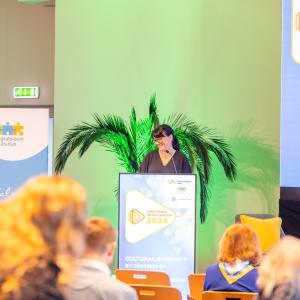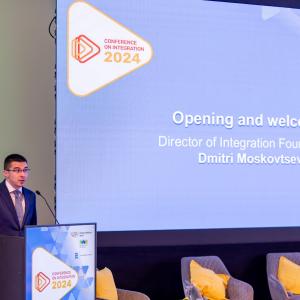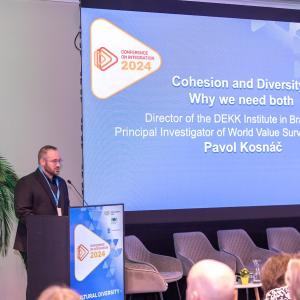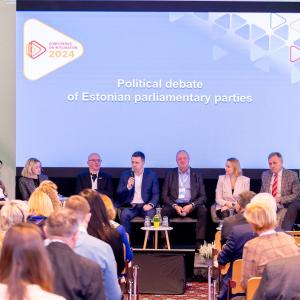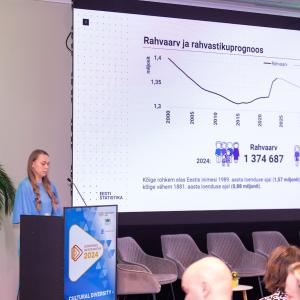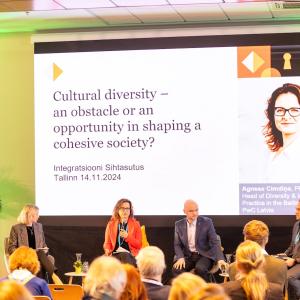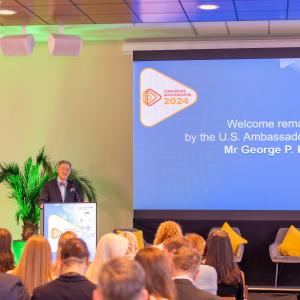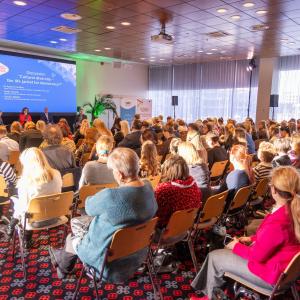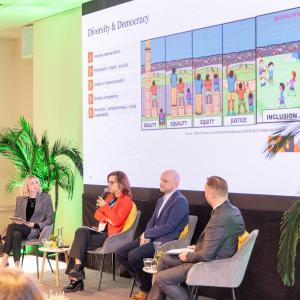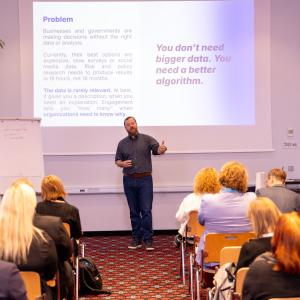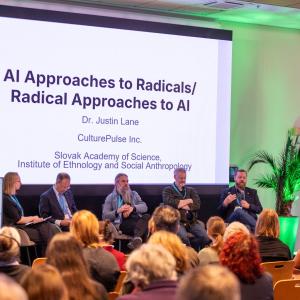On 14–15 November 2024, the integration conference ‘Cultural diversity – an obstacle or an opportunity in shaping a cohesive society?’ brought together experts and opinion leaders from across the world. Two productive days offered discussions about information and value space, reasons for radicalisation in democratic countries, presidential elections in the US, and the future of Europe. Speakers of the integration conference proposed a vision for a better tomorrow, describing both challenges as well as solutions to the problems of today.
The conference was opened by Heidy Purga, Minister for Culture, and Dmitri Moskovtsev, Director of the Integration Foundation. George P. Kent, Ambassador of the United States of America to Estonia, also passed along his greetings. On the first day of the conference, everyone interested in the topic could listen to the discussions via live webcast. The international conference took place in English, but everyone who wanted could listen to the conference in Estonian or Russian.
The first discussion of the first day focused on the role of cultural diversity in a democratic society from the aspects of private sector, security, functioning in times of crisis as well as the rights of minorities, comparing the experiences of Estonia, Latvia, and Lithuania. Following this, JJ Green, a security correspondent of a leading radio station in Washington, the capital city of the US, shared his observations on security, the impact of misinformation on societal cohesion, and the situation in the US after the presidential elections.
You could also listen to the debate of Estonian parliamentary parties on current issues related to diversity and an overview of the diversity of Estonian population and migration by Statistics Estonia. Professor Marju Lauristin shared her observations on the dimensions of integration and commented on current topics and political decisions from the point of view of cohesion in the society, highlighting several risk areas requiring attention. The day ended with a meaningful debate on the diversity of the information and value space from the point of view of a coherent society, paying particular attention to the spread of misinformation and issues it causes.
On the second day of the conference, the so-called Chatham House rule was in force, which means that you needed to be present to participate in the conference and the thoughts expressed could later only be disclosed in general terms without reference to a specific speaker or person expressing the opinion. This created a cosy atmosphere full of trust and gave the speakers confidence to express their opinions clearly on even the most critical subjects. On the second day, experts from the US, Sweden, Denmark, and Estonia discussed topics related to social cohesion, migration, radicalisation as well as elections that have taken place and will take place in Europe and the US. They discussed the possible outcomes in the near future in the light of the trends of the last few years. In addition, three practical workshops took place, focusing on grassroots activism, opportunities offered by the AI to monitor media and predict the development of societal processes, and competence in diversity as a key to organisational development.
Some of the thoughts expressed at the conference were as follows:
- It is not possible to integrate someone somewhere by force. As a society, it is possible to create conditions for those who want to integrate. To build an open society and support cultural diversity, we must accept (new) arrivals as if at home: ‘Welcome to our home! Here, it is customary...’
- Diversity is more than nationality – it is also the gender, social status, religious background, etc. of a person. Our subjective evaluations and stereotypes of various persons and situations are largely based on our personal experiences. It is not wrong, but we must keep that in mind, including in organisational culture.
- Radicalisation is a gradual process affected by various factors, such as being exposed to humiliation and violence, belonging in a marginalised group, big shifts in personal life (migration, unemployment, becoming a university student, etc.). 99% of radicalised people never become violent in real life, but the remaining 1% can commit horrible acts that impact the entire society.
- Discussing migration and (new) arrivals as if everything were out of control is often one of the reasons causing tensions in the society. These topics should be discussed openly and calmly, explaining the situation and prospects – this helps maintain a sense of security and safety.
- Today, life itself is under attack by disinformation. It destroys life like broken glass. We often cannot see the broken shards that have potentially landed quite far. They cause damage – therefore, we need to find them and remove them. Disinformation causes chaos, confusion, distrust, and violence.
- AI is an excellent tool for understanding the meaning, causes, links, and patterns of societal processes in addition to describing them. It is also helpful in predicting future events based on gathered information. For example, it is possible to model the impact of raising taxes.
- To keep a firm course of democracy on a sea of multitude of views and beliefs, we need excellent navigation systems and skills. This means a critical mind, cooperation, and comprehension of our basic values and personal freedoms, civil rights, and obligations.
- Let us focus on values that are always around us but which we often fail to notice – cultural diversity in the meaning of the cultural diversity of communities and nationalities.
- We need to begin combating disinformation by teaching media literacy to our children. Children are flexible, open-minded like small sponges that absorb information, and not afraid to experiment. For them, it is a lot easier to learn to navigate in a world full of information.
- Integration does not depend on a document in the pocket; instead, it is a process of establishing trust.
- Unity and diversity must be in balance. People are not ants who find unity, absolute structure, and lack of individuality natural – diversity is an inseparable part of human society, guaranteeing creativity, development, and success. As stated by Edward O. Wilson, a sociologist from the University of Harvard, when asked for his opinion on the dream of a Communist utopia: ‘Great idea. Wrong species.’
- Having or not having citizenship does not correlate with identity or preparedness for defence. After the restoration of Estonian independence, citizenship policy was extremely formal, people became citizens for pragmatic reasons, and as a result, passport in the pocket is not an indication of the actual mindset today.
- We are not divided by our differences, but by our inability to recognise, accept, and celebrate these differences.

